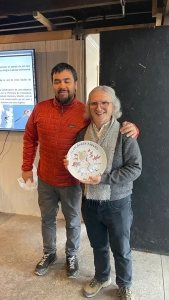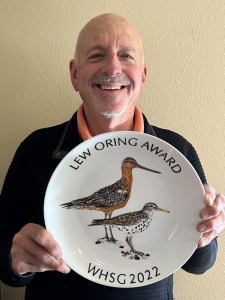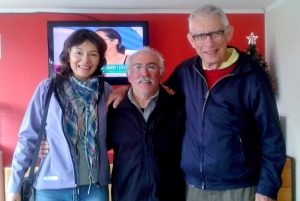Awards
The WHSG currently gives out two awards in honor of the advances in shorebird conservation and research that each person made as well as fostered through their students and colleagues. Award recipients, chosen for making similar contributions during their careers, will receive a plaque, monetary award, and be invited to give a plenary talk at the following Western Hemisphere Shorebird Group meeting.
Currently we are accepting donations for each award that will go toward establishing an endowment. Should you wish to donate money towards either award, please contact Rick Lanctot, richard_lanctot [at] fws dot gov.
Allan Baker Lifetime Achievement Award for Shorebird Conservation

In honor of advances made by Professor Allan J. Baker and fostered through his colleagues, partners and students in the Western Atlantic Flyway, the Western Hemisphere Shorebird Group wishes to present The Allan Baker Lifetime Achievement Award for Shorebird Conservation to an individual who has made similar contributions at each biennial meeting. The award recipient will receive a plaque, a monetary award, and be invited to give a plenary talk at the following Western Hemisphere Shorebird Group meeting.
Allan Baker was one of the world’s outstanding minds in shorebird conservation and genetics. The shorebird community misses him greatly following his passing on 20 November 2014. Born in Westport, New Zealand on 9 July 1943, Allan grew up on a small farm on the South Island. Likely inspired by the wildlife of the beaches that accompanied his childhood, he obtained a PhD on the ecology and evolutionary history of the world’s oystercatchers at the University of Canterbury in Christchurch in 1972. He then moved to Toronto, Canada, where he became the ornithology curator at the Royal Ontario Museum (ROM); he soon became a leader in evolutionary genetics with a particular interest in understanding the evolution of shorebirds. He taught molecular evolution at the Department of Ecology and Evolution at the University of Toronto and he directed a DNA laboratory at the ROM. He subsequently became the Senior Curator of Ornithology and Head of the Department of Natural History at this institution.
Allan became deeply involved in the conservation of migratory shorebirds when large declines were being documented throughout the flyways of the world in the late 1990s. Along with Professor Theunis Piersma of the University of Groningen in the Netherlands, he co-founded the Global Flyway Network; this group of international researchers focuses on identifying migratory shorebirds at risk, the reasons behind their population declines, and the implementation of conservation initiatives. Beginning in 1995, he partnered with Patricia M. González from Argentina and other colleagues to promote and build ties among the people living at the main sites used by the rufa Red Knot (Calidris canutus) throughout the Western Atlantic Flyway. During his many international banding expeditions in South America, Allan taught local students, rangers and volunteers about shorebird ecology and conservation. This team fosters scientific knowledge at sites throughout the flyway that can be translated into local conservation measures. Among the more than 180 papers published by him and his students/collaborators, one of his bested cited papers is an investigation into the fitness consequences of decreased refueling rates and late arrival of Red Knots in Delaware Bay that was published in the Proceedings of the Royal Society B. in 2004. His inspiration is alive through the work of his former students and colleagues, but also within the citizens of the many communities that feel the pride of receiving and protecting shorebirds along the flyway.
Lew Oring Lifetime Achievement Award for Shorebird Research
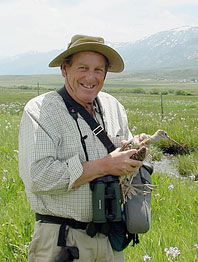
In honor of advances made by Professor Lewis Oring and fostered through his students, the Western Hemisphere Shorebird Group wishes to present The Lewis W. Oring Lifetime Achievement Award for Shorebird Research at each biennial meeting to an individual who has made similar contributions. The award recipient will receive a plaque, a monetary award, and be invited to give a plenary talk at the following Western Hemisphere Shorebird Group meeting.
Lew Oring is a world-renowned behavioral ecologist who dedicated his life to understanding full life cycle biology and mating systems in shorebirds of North America, Scandinavia, and Australia. Lew received his training in ornithology at the University of Oklahoma (1960-1966) where he worked with Dr. George M. Sutton studying molt in Gadwall (Anas strepera), but also began a study of the Buff-breasted Sandpiper (Calidris subruficollis). After receiving his Ph.D. he undertook two postdoctoral positions. One in Denmark with Dr. Hans Lind, at the University of Copenhagen, studying Green Sandpipers (Tringa ochropus); the other with Dr. Frank McKinney at the University of Minnesota, studying Solitary Sandpipers (T. solitaria) in Alberta, Canada. Lew was a professor at the University of North Dakota for 22 years, where he sponsored 3 Post-doctoral Fellows, 5 Ph.D. students, and 13 M.S. students.
There he began his long-term behavioral ecology study of the Spotted Sandpiper (Actitis macularius). Assisted by graduate and post-graduate students, he unraveled many mysteries associated with the polyandrous mating system of this species. In 1991, Lew moved to the University of Nevada, Reno, where he mentored an additional 4 Post-doctoral Fellows, 5 Ph.D. students, and 2 M.S. students. In total, all seven Post-doctoral Fellows, seven of the 10 Ph.D.s, and four of the 15 M.S. students focused on the behavioral ecology of shorebirds. He retired in 2006 from the University of Nevada, Reno, where currently he is a Professor Emeritus. Lew remains active in local conservation efforts and advising shorebird researchers. Many of Lew’s students occupy leading positions in academia and government in the U.S. and Canada where they continue their focus on shorebird ecology. During his career, Lew and his students/collaborators published 159 papers. Lew intensely studied the breeding biology of 12 shorebird species, with a large focus on Spotted Sandpipers, American Avocets (Recurvirostra americana) and Killdeer (Charadrius vociferous). Landmark papers include a Science Citation Classic co-authored with Stephen T. Emlen entitled “Ecology, sexual selection, and the evolution of mating systems”; a Nature Classic entitled “Cuckoldry through stored sperm in the sequentially polyandrous Spotted Sandpiper” (later popularized in Natural History as “The early bird gives the sperm”); an Avian Biology monograph entitled “Avian Mating Systems;” and white papers entitled “National Shorebird Research Needs” prepared as part of the U.S. Shorebird Conservation Plan and “Guidelines for Use of Wild Birds in Research” with Toby Gaunt, which is the standard metric for all.
Pablo Canevari Award
Pablo Canevari was Manomet’s first director of the WHSRN Executive Office. Born in Argentina, Pablo was a beloved colleague, scientist, illustrator, and a dear friend to all who knew him. He passed away suddenly in 2000 and is particularly remembered for his dedication, extraordinary enthusiasm, and personal and professional commitment to shorebird conservation in the Americas.
a beloved colleague, scientist, illustrator, and a dear friend to all who knew him. He passed away suddenly in 2000 and is particularly remembered for his dedication, extraordinary enthusiasm, and personal and professional commitment to shorebird conservation in the Americas.
Every two years, Manomet presents a USD$2,000 award to an individual or organization from Latin America or the Carribean that has demonstrated an outstanding commitment to shorebird conservation—much the way Pablo Canevari did before he died suddenly in March 2000.
The award recognizes and supports exemplary work in the field of shorebird conservation. Pablo is remembered for his extraordinary dedication and passion—personally and professionally—to the conservation of shorebirds throughout his career.
More information about the award can be found here.
WHSG Awards: Nomination Guidelines
All Awards: Nominations are due on 1 May in the year of the next WHSG meeting (2019, 2022, 2024, etc.) and are limited to two pages that are single-spaced. Please submit your award nomination in English and Spanish. The WHSG Awards Committee recommends that awards be limited to individuals or teams who have conducted most of their shorebird conservation/research within the Western Hemisphere, and recommends individuals or teams receive an award only once.
Allan Baker Lifetime Achievement Award for Shorebird Conservation: Nominations should include: (1) the name, institution, and contact information for the nominee(s), (2) a current CV of the nominee(s), and (3) a written summary for why the nominee(s) should be considered, including statements on conservation accomplishments, his/her/their leadership in avian conservation, and documentation of the conservation implications of the candidate’s work. Nominations should be submitted electronically to River Gates for the 10th WHSG meeting (e-mail: River.Gates@audubon.org).
Lewis W. Oring Lifetime Achievement Award for Shorebird Research: Nominations should include: (1) the name, institution, and contact information for the nominee(s), (2) a current CV of the nominee(s), and (3) a written summary for why the nominee(s) should be considered, including statements on research accomplishments, his/her/their leadership in avian research, and how the candidate’s research has advanced the scientific understanding of shorebirds and of science overall. Nominations should be submitted electronically to River Gates for the 10th WHSG meeting (e-mail: river.gates@audubon.org).
Pablo Canevari Award: Please fill out the nomination form (available at https://whsrn.org/about-whsrn/pablo-canevari/) and submit electronically to whsrn@manomet.org
2022 Award Winners
The Allan Baker Lifetime Achievement Award for shorebird conservation was given to Luis Espinosa (right side) from Fundación Conservación Marina, Chile. Throughout his 30 years of contribution to ornithology and bird conservation in Chile, Luis has published a series of scientific works, where his contributions to the knowledge of Limosa haemastica, Phoenicopterus chilensis, Elaenia albiceps and wetlands stand out relevant for the conservation of aquatic birds in Chile. His experience and knowledge have led to the legal recognition of several wetlands that are critical sites for the conservation of migratory shorebirds in southern Chile. This includes two marine wetlands that are now part of the Western Hemispheric Shorebird Reserve Network (WHSRN) and three new Nature Sanctuaries (protected site in Chile). Luis also one of the creators of the Maullín Ornithological Meeting, a citizen space for the dissemination of bird conservation knowledge at local level, which has inspired many young people to follow the path of ornithology. He also oversaw the design of the “Maullín River Ornithological Park”, in southern Chile – the first bird theme park in a natural environment in Chile and has worked to protect other private areas in the country.
The Lewis W. Oring Lifetime Achievement Award for Shorebird Research was presented to Dr. Robert E. Gill, Jr., Research Wildlife Biologist Emeritus from the U. S. Geological Survey (USGS), Alaska Science Center, United States. Bob Gill’s 55-year research career demonstrates to the maximum extent how to turn the substantial opportunities available to a U. S. federal government biologist into outstanding science, in part through collaborations with international teams of students and established academics, as well as his colleagues within government agencies. His work spans the migration, population, and breeding biology of Bristle-thighed curlews, whimbrels, and bar-tailed and marbled godwits, and that of smaller species, including dunlin, black and ruddy turnstones, plus poorly known species including wandering tattlers, and rock, Baird’s and sharp-tailed sandpipers. His scientific work has contributed directly to conservation planning and action. He has participated in a host of organizational efforts, including being a founding member of the Alaska Shorebird Group. He gave the opening Keynote talk at the Shorebird Science in the Western Hemisphere meeting in Boulder, Colorado in 2006, entitled ‘Are We a Flock and Where are We Going?’. The vision presented in that talk helped shape the development of the Western Hemisphere Shorebird Group and its subsequent series of hemispheric-wide meetings. He was an early chair of the US Shorebird Conservation Plan’s Research group and worked on the Canadian Shorebird Plan. He has been an active member of the International Wader Study Group for several decades.
The Pablo Canevari Award was presented to Luis Benegas (center) who has more than 30 years of experience working with shorebirds in Tierra del Fuego. Since the 1980s, Luis has worked tirelessly to conserve shorebirds in Argentina. He was instrumental in the declaration of the Reserva Costa Atlántica de Tierra del Fuego WHSRN site—an area of hemispheric importance for shorebirds—in 1992. He was also part of WHSRN’s Argentine National Council from 2007-2013 and is a founding member of the Birdwatchers Club in Rio Grande Tierra del Fuego (COA Río Grande ). Above all, Luis excelled in connecting shorebirds to local leaders and the general public, leading to long-term conservation of important sites in Tierra del Fuego.
2019 Award Winners
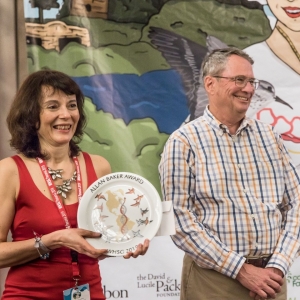 The Allan Baker Lifetime Achievement Award for Shorebird Conservation was given to Stan Senner, Vice President for Bird Conservation-Pacific Flyway, National Audubon Society, USA. For the past 40 years, Stan Senner has contributed his considerable expertise in avian ecology, environmental policy, and strategic conservation by leading flyway-wide initiatives to protect shorebird populations. Stan’s career has been an effective leader for many other prominent conservation and governmental organizations, including the Audubon Alaska, Ocean Conservancy, the Exxon Valdez Oil Spill Trustee Council, Hawk Mountain Sanctuary Association, and as staff to a U.S. House Representative. In addition to many internal policy directives, Stan has contributed to conservation by authoring over 34 technical publications including 17 peer-review papers, two Birds of North America species accounts (Surfbird and Broad-winged Hawk), six popular birding articles, four conference symposia, and five book chapters.
The Allan Baker Lifetime Achievement Award for Shorebird Conservation was given to Stan Senner, Vice President for Bird Conservation-Pacific Flyway, National Audubon Society, USA. For the past 40 years, Stan Senner has contributed his considerable expertise in avian ecology, environmental policy, and strategic conservation by leading flyway-wide initiatives to protect shorebird populations. Stan’s career has been an effective leader for many other prominent conservation and governmental organizations, including the Audubon Alaska, Ocean Conservancy, the Exxon Valdez Oil Spill Trustee Council, Hawk Mountain Sanctuary Association, and as staff to a U.S. House Representative. In addition to many internal policy directives, Stan has contributed to conservation by authoring over 34 technical publications including 17 peer-review papers, two Birds of North America species accounts (Surfbird and Broad-winged Hawk), six popular birding articles, four conference symposia, and five book chapters.
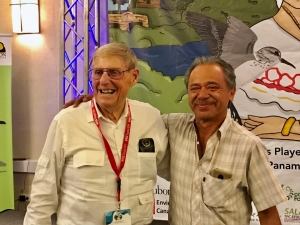 The Lewis W. Oring Lifetime Achievement Award for Shorebird Research was presented to Dr. Roberto Carmona (right), Professor, Universidad Autónoma de Baja California Sur, Mexico. Roberto Carmona has dedicated his entire professional career to the study and conservation of shorebirds and their habitat in northwestern Mexico. Roberto has designed, directed and implemented numerous research, exploration, monitoring, education and conservation projects of shorebirds in the Pacific Migratory Corridor. Examples include a shorebird research program of the Ojo de Liebre Lagoon complex and the Guerrero Negro salt mine; study and conservation of Red Knots (Calidris canutus roselaari) and Dunlin (C. alpina) during spring migration through the Upper Gulf of California and their relationship with spawning fish; and the exploration of wintering areas and reproduction of shorebirds in the states of Sonora and Sinaloa. He has advised 35 Bachelor thesis, Master of Science or Doctorate degrees on shorebirds; and published 75 scientific articles and book chapters on the ecology and migration of shorebirds in northwestern Mexico. He has helped designate six wetlands in northwestern Mexico (two more in progress) as Western Hemisphere Shorebird Reserve Network sites.
The Lewis W. Oring Lifetime Achievement Award for Shorebird Research was presented to Dr. Roberto Carmona (right), Professor, Universidad Autónoma de Baja California Sur, Mexico. Roberto Carmona has dedicated his entire professional career to the study and conservation of shorebirds and their habitat in northwestern Mexico. Roberto has designed, directed and implemented numerous research, exploration, monitoring, education and conservation projects of shorebirds in the Pacific Migratory Corridor. Examples include a shorebird research program of the Ojo de Liebre Lagoon complex and the Guerrero Negro salt mine; study and conservation of Red Knots (Calidris canutus roselaari) and Dunlin (C. alpina) during spring migration through the Upper Gulf of California and their relationship with spawning fish; and the exploration of wintering areas and reproduction of shorebirds in the states of Sonora and Sinaloa. He has advised 35 Bachelor thesis, Master of Science or Doctorate degrees on shorebirds; and published 75 scientific articles and book chapters on the ecology and migration of shorebirds in northwestern Mexico. He has helped designate six wetlands in northwestern Mexico (two more in progress) as Western Hemisphere Shorebird Reserve Network sites.
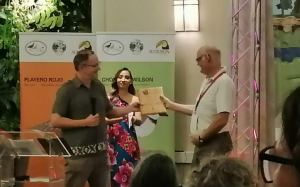 The Pablo Canevari Award was presented to Ben Haase (right), the curator of the Museo de Ballenas in Salinas, Ecuador. Ben is a naturalist-guide who has carried out long-term studies on the presence, migration, and behavior of shorebirds on the Ecuadorian coast beginning in 1986. He has conducted 500 censuses exceeding two and a half million birds. His surveys resulted in the nomination of the Piscinas Artificiales de Ecuasal as a Western Hemisphere Site of Regional Importance in 2007 due to the large number of Wilson’s Phalarope (Phalaropus tricolor). Ben has organized many training courses; this activity and the publication of his book entitled “Marine Birds of Continental Ecuador” in 2011 resulted in the training of hundreds of people. Ben has been the director of the Museo de Ballenas since 2003 and has had over 12,000 visitors.
The Pablo Canevari Award was presented to Ben Haase (right), the curator of the Museo de Ballenas in Salinas, Ecuador. Ben is a naturalist-guide who has carried out long-term studies on the presence, migration, and behavior of shorebirds on the Ecuadorian coast beginning in 1986. He has conducted 500 censuses exceeding two and a half million birds. His surveys resulted in the nomination of the Piscinas Artificiales de Ecuasal as a Western Hemisphere Site of Regional Importance in 2007 due to the large number of Wilson’s Phalarope (Phalaropus tricolor). Ben has organized many training courses; this activity and the publication of his book entitled “Marine Birds of Continental Ecuador” in 2011 resulted in the training of hundreds of people. Ben has been the director of the Museo de Ballenas since 2003 and has had over 12,000 visitors.
2017 Award Winners
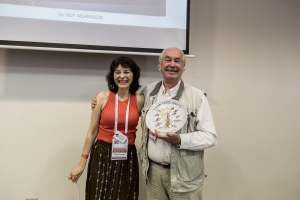 The Allan Baker Lifetime Achievement Award for Shorebird Conservation was given to Guy Morrison. Guy is a legendary character, who has been involved with shorebird conservation for 50 years. In the 1980s, in partnership with Ken Ross, he carried out a shorebird survey along the entire coast of South America; he was also instrumental in founding the WHSRN. He was appointed a Member of the Order of Canada for his contributions to the conservation of Arctic shorebirds and other migratory species. Although he has retired from Environment and Climate Change Canada, where he worked as a Senior Research Scientist for many years, he retains an emeritus position and continues to contribute to Environment Canada’s role of ensuring that wildlife is conserved and protected.
The Allan Baker Lifetime Achievement Award for Shorebird Conservation was given to Guy Morrison. Guy is a legendary character, who has been involved with shorebird conservation for 50 years. In the 1980s, in partnership with Ken Ross, he carried out a shorebird survey along the entire coast of South America; he was also instrumental in founding the WHSRN. He was appointed a Member of the Order of Canada for his contributions to the conservation of Arctic shorebirds and other migratory species. Although he has retired from Environment and Climate Change Canada, where he worked as a Senior Research Scientist for many years, he retains an emeritus position and continues to contribute to Environment Canada’s role of ensuring that wildlife is conserved and protected.
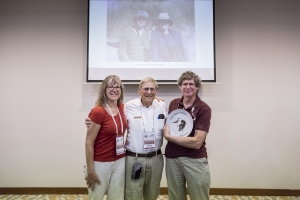 The Lewis W. Oring Lifetime Achievement Award for Shorebird Research was presented to David (Dov) Lank and Connie Smith. Dov Lank has devoted 30 years of research toward understanding reproductive strategies within and between the sexes of a variety of shorebirds and other species viewed in the context of population biology and evolutionary ecology. He is most noted for his extensive research on Ruffs Philomachus pugnax in which he has, through careful maintenance of a captive flock, unraveled the genetic mysteries associated with male mating strategies and plumage variation. His work and the way he has motivated others has inspired many graduate students to pursue careers in behavioral and conservation ecology. He has always and continues to work as a Research Associate and Adjunct Professor in the Behavioral Ecology Research Group at the Centre for Wildlife Ecology (CWE) at Simon Fraser University, Canada. Connie has been a major supporter of Dov, his graduate students, and the CWE department (not to mention their two daughters) for >30 years. Her invaluable assistance has enabled Dov, his students, and all the many shorebird projects to enjoy great success over the years.
The Lewis W. Oring Lifetime Achievement Award for Shorebird Research was presented to David (Dov) Lank and Connie Smith. Dov Lank has devoted 30 years of research toward understanding reproductive strategies within and between the sexes of a variety of shorebirds and other species viewed in the context of population biology and evolutionary ecology. He is most noted for his extensive research on Ruffs Philomachus pugnax in which he has, through careful maintenance of a captive flock, unraveled the genetic mysteries associated with male mating strategies and plumage variation. His work and the way he has motivated others has inspired many graduate students to pursue careers in behavioral and conservation ecology. He has always and continues to work as a Research Associate and Adjunct Professor in the Behavioral Ecology Research Group at the Centre for Wildlife Ecology (CWE) at Simon Fraser University, Canada. Connie has been a major supporter of Dov, his graduate students, and the CWE department (not to mention their two daughters) for >30 years. Her invaluable assistance has enabled Dov, his students, and all the many shorebird projects to enjoy great success over the years.
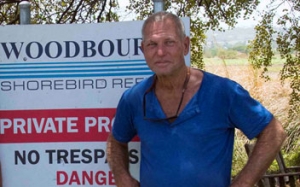 The Pablo Canevari Award was presented to Wayne Burke from Barbados. Wayne is an avid shorebird conservationist and founder of the Barbados Shorebird Conservation Trust. In 2008, Wayne began working with BirdLife International to lead efforts with local hunters to address the unsustainable take of shorebirds on Barbados. His efforts led to many favorable changes in the culture of hunting on the island, including self-imposed bag limits by hunters, and the creation of the Woodbourne Shorebird Refuge among other extremely important habitats for shorebird conservation in the country.
The Pablo Canevari Award was presented to Wayne Burke from Barbados. Wayne is an avid shorebird conservationist and founder of the Barbados Shorebird Conservation Trust. In 2008, Wayne began working with BirdLife International to lead efforts with local hunters to address the unsustainable take of shorebirds on Barbados. His efforts led to many favorable changes in the culture of hunting on the island, including self-imposed bag limits by hunters, and the creation of the Woodbourne Shorebird Refuge among other extremely important habitats for shorebird conservation in the country.


